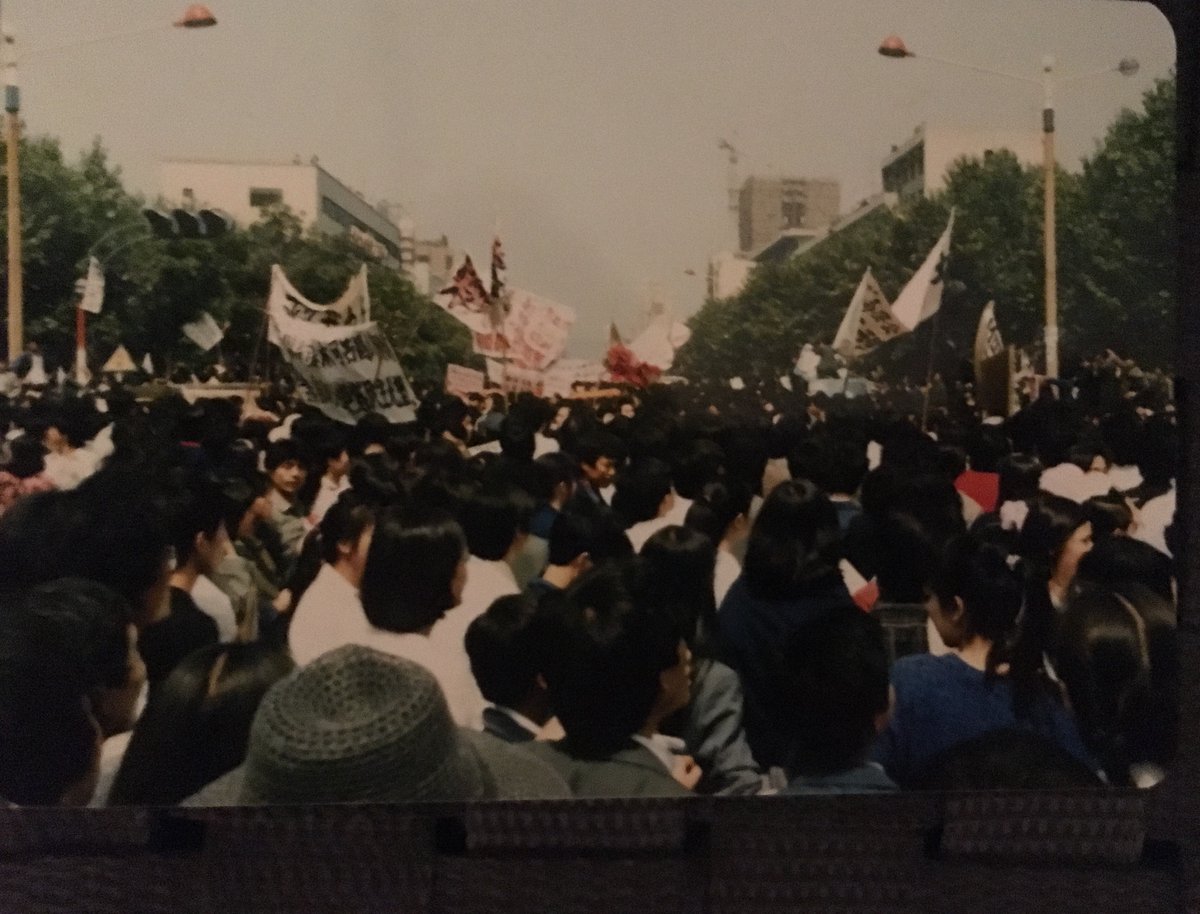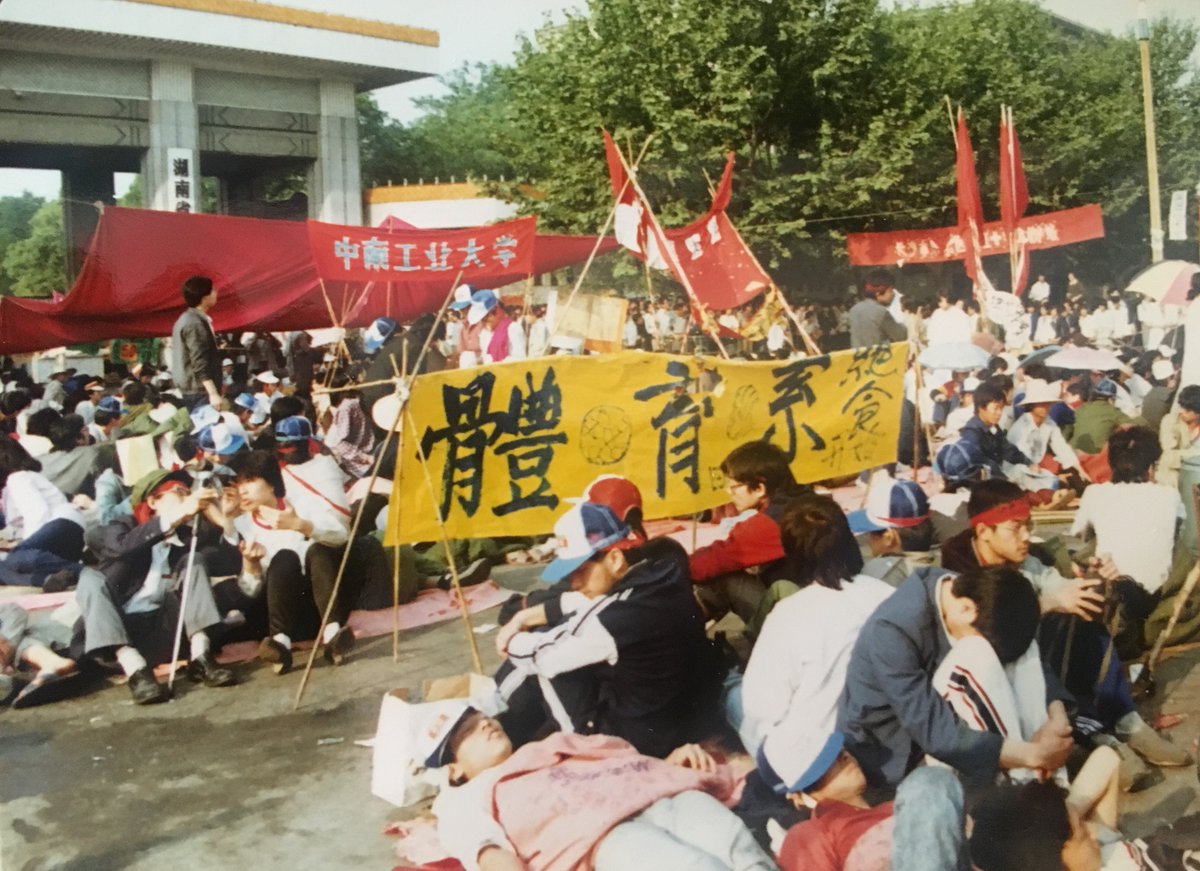You were in China during the spring of 1989, why and where were you exactly?
I went to China with the Yale-China Association after graduating from Yale with a double major in East Asian Studies and history. I was in Changsha, the capital of Hunan, on a two-year English teaching fellowship at the Hunan Medical University (HMU). The student protests began just a few months before the end of my fellowship.
Was it hard for you to adjust to China back then? Did you make a lot of friends?
Yes and no. I had taken some time off during college in 1984 and spent several months in Taiwan studying Chinese and then traveled for about two months on my own in the mainland. I found it endlessly fascinating, and was encouraged that I could actually communicate effectively in Chinese.
So when I got to China in 1987 I had a pretty clear idea of what to expect, but being part of a work unit provided a new set of bureaucratic challenges and nonsensical things I had to adjust to. I tried my best to go with the flow, accept uncertainty, and maintain a good sense of humor.
I did make quite a few friends in China. Some of my students became good friends over time, as well as my Chinese English teacher colleagues, and other teachers at the school. I also became friends with some of the young tennis crowd in Changsha.

The ‘89 Democratic Movement started in April, what was the first reaction in Changsha? What was the reporting on the situation in Beijing like? Do you remember any press reports?
I can really only speak to what was happening on the campus of HMU. Students were definitely discussing the death of former CCP General Secretary Hu Yaobang on April 15, and there may have been a few wreaths put up in his honor at the school, but it was subdued. There was a sense of sadness in the air. As a liberal reformer who had been purged because he took a moderate stance toward student protests in December 1986-87, Hu Yaobang was admired and respected by students.
Regarding the press, one of the most incredible moments for Chinese and foreigners alike during the spring of ’89 was when the press started reporting the real news. I think this varied by locale and some media outlets were more out in front, pushing the envelope. CCTV regularly reported the real news during May. VOA and BBC also played a very important role in reporting what was happening in Beijing to the rest of the country. Students transcribed the VOA and BBC broadcasts and posted the highlights around town, updating them regularly throughout the day.
The Changsha Evening News also published news about what was happening in Beijing, sometimes running Xinhua reports. It’s certainly hard to imagine now! Press freedom became a big issue and it was inspiring to see journalists and editors exercise those rights during the movement. Journalists and media, including the People’s Daily, marched in Beijing, demanding press freedom. In Changsha, I saw a banner identifying a group from the Hunan Daily. A popular slogan among the media workers who were protesting was “We Want to Report the Truth!”
Did you get any, even if unofficial, reports on protests outside of Beijing?
Yes, some national newspapers mentioned the fact that protests had occurred in places outside Beijing. Locally, the Changsha Evening News ran reports mentioning protests in other cities in Hunan, and reported when groups from other cities showed up in Changsha to demonstrate. Voice of America also occasionally had reports on demonstrations in other cities, particularly Shanghai. Students who went home during the unprecedented 7-week period of demonstrations and freedom came back to school with reports on what was happening in their hometowns. It was a national movement on a larger scale than we likely will ever know.
Were people aware of the crackdown in Tibet earlier that year? What did they think of it?
No one I knew talked about Tibet. Tibet was not on their radar screen. And I didn’t talk about Tibet (although I had spent an unforgettable month traveling on the plateau in the summer of 1987). I was teaching at a medical university that was known for being politically apathetic. Perhaps students at other universities in Changsha knew about martial law being imposed in Tibet.
When did people in Changsha start to protest as well? Was it mainly students?
HMU was late to join the protests. The first time students at HMU marched as a school in a citywide demonstration of all the Changsha universities was the evening of May 17. Students at the schools in the university district, such as Hunan Teachers College, Hunan University, and South Central Industrial University, were in the forefront of the movement in Changsha and had organized demonstrations before May 17. Students were driving the movement and were the main participants, but people from all walks of life got involved, including workers, teachers, journalists, and laobaixing.
What was it the people were actually protesting against? If they were pro-democracy, what was their understanding of what democracy means?
People were protesting against corruption and they sought more individual freedom and basic human rights – the same rights they were exercising during the movement: freedom of expression, freedom of association and peaceful assembly, freedom of the press, etc. Everything was very tightly controlled before April 15, and there was a strong sense of oppression and depression in the air: the work-unit 单位 system had a stranglehold on the work force, and university students had an absurd number of rules they had to follow. For example, at HMU, first and second-year students were not allowed to have boyfriends or girlfriends, and third-year students had to “register” if they were involved with someone. It’s no surprise there was a “going abroad craze” chuguo re at that time.
The movement was a nationwide pro-democracy movement. My view is that how particular protestors understood or defined democracy is not important. They knew that it was absent—they had no say in their government. They wanted input in determining their political system and government leaders; they sought accountability and transparency. How was it that China was still being ruled by a bunch of old men who were completely out of touch with society and the people’s desires and concerns? Many signs and chants touched on this issue. The calls for “the Elders” to retire were widespread.

What was the local reaction when martial law was imposed on May 20? Did it scare the locals or incite them to participate in larger numbers?
Martial law was declared only in Beijing, but things took a more serious and solemn turn in Changsha after the martial law declaration. People were angry and dismayed, and protested against martial law the next day. One student from another university who was marching in the demonstration protesting martial law saw me on the sidewalk observing, and called out in English: “How can our government be so cruel?”
What was the atmosphere like before June 4?
Many students had returned to class by May 30. There was a sense that the movement was over; the Changsha students had heard that students in Beijing were going to leave Tiananmen Square –- this was before the Goddess of Democracy appeared. I recall that my students expressed concern about the “settling of accounts” 秋后算账 during this time; in other words, they were worried about how they might be punished.
Could you tell us what happened immediately after the massacre in Beijing? What were the first reactions? What was the atmosphere like?
Early in the morning of June 4, a Sunday, some students came rushing over to the house where the Yale-China Association teachers lived. They had learned the news from VOA, and banged on the door to wake us up (the American teachers were still asleep at 6 or 6:30 am on Sunday). They were distraught and angry. Some were crying. I was in shock.
Do you believe another similar protest is possible today? Is there any hope for change?
Because China today is now a high-tech police state with near total surveillance; a nationwide popular movement on the scale of 1989 is impossible. It could only happen with a collapse of the CCP. But smaller protests happen frequently in China. They are usefully quite specific in terms of the issue and demand, such as the recent protests by parents whose children were given expired polio vaccines.
Change is always possible.
What do you think the West should do, if anything, about the current human rights situation in China?
Rights-respecting governments and people should do whatever they can to support human rights defenders and victims of human rights abuses in China and elsewhere, including in our own countries. Specifically with respect to China, we need to be taking much stronger measures; one obvious example where a more robust intervention is needed urgently is the mass internment by the CCP of over 1 million Uyghurs in Xinjiang.
Andréa Worden, J.D., is a researcher, translator and consultant whose work focuses on human rights and rule of law in China, and China’s interactions with the UN human rights mechanisms. She will be a visiting lecturer this fall in the East Asian Studies Program at Johns Hopkins Krieger School of Arts & Sciences.
Interview by Filip Jirouš.
Sinopsis is publishing this interview as part of a series on the 30th anniversary of the Tian’anmen massacre.
